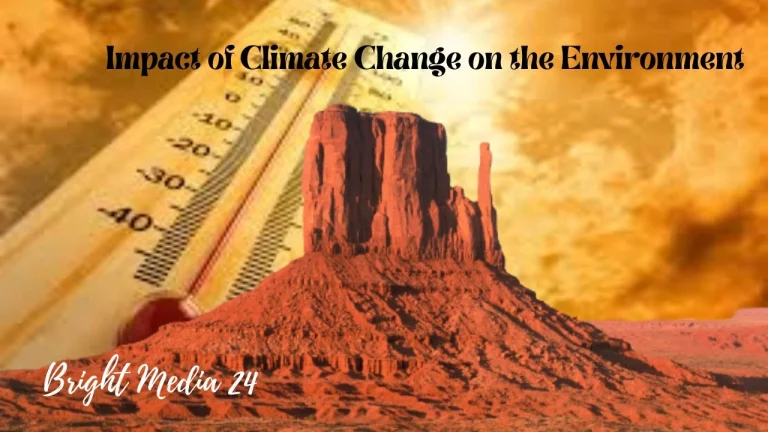Climate change is one of the most pressing issues of our time. It is a global phenomenon that affects every living organism on the planet. In this article, we will explore the various causes and effects of climate change, as well as the different ways to mitigate its impacts. We’ll also take a closer look at renewable energy solutions and the role of government in addressing climate change.
Definition of Climate Change
Climate change refers to the long-term changes in the average weather patterns that have come to define Earth’s local, regional, and global climates. It is a result of the warming of the Earth’s surface temperature that has occurred since the beginning of the Industrial era. This warming effect is largely attributed to human activity, resulting from increased emissions of greenhouse gases, such as carbon dioxide, methane, and nitrous oxide.
Importance of Understanding Climate Change
Understanding climate change is crucial if we want to take steps to mitigate its impacts. It affects our planet’s ecosystems, natural resources, and economy. The consequences are far-reaching, and we all need to take action to address this critical challenge.
Causes of Climate Change
Natural Causes of Climate Change
The Earth’s climate has been changing for millions of years, even before humans existed. Some of the natural causes of climate change include volcanic activities, variations in the Earth’s orbit and solar radiation, and changes in the Earth’s surface albedo. These factors can cause changes in the planet’s temperature, precipitation patterns, and sea level.
Human Activities and their Impact on Climate Change
Human activity is the primary cause of climate change in the modern era. We are adding to the natural greenhouse effect, which keeps the planet’s temperature within livable range, by emitting more greenhouse gases than can be absorbed by the natural sinks like oceans and forests. This increased concentration of greenhouse gases causes the planet’s temperature to rise, which leads to changes in precipitation patterns, ice sheet melting, sea level rise, and extreme weather events.
Greenhouse Gases and Climate Change
What are Greenhouse Gases?
Greenhouse gases are gases that trap heat in the Earth’s atmosphere, just like a greenhouse traps heat to grow plants. The main greenhouse gases are carbon dioxide, methane, and nitrous oxide, produced by industrial, agricultural, and transport activities. These gases trap heat in the atmosphere, leading to an increase in the Earth’s average temperature.
Role of Greenhouse Gases in Climate Change
The increased concentration of greenhouse gases in the atmosphere leads to an increase in the Earth’s surface temperature. This warming effect is known as the greenhouse effect. This effect is responsible for the observed increase in the frequency and intensity of extreme weather events like heatwaves, floods, hurricanes, and droughts.
Effects of Climate Change
Climate change has far-reaching impacts on the environment, human health, economies, agriculture, biodiversity, and weather patterns:
Impact of Climate Change on the Environment
Climate change affects the environment in a variety of ways. It is causing changes in sea level, melting glaciers, and sea ice, leading to loss of habitat, and rising ocean temperatures. It also leads to ocean acidification, water scarcity, and impacts on freshwater resources, leading to loss of biodiversity, and loss of carbon sequestration capacity on the planet.
Impact of Climate Change on Human Health
Climate change has significant implications for human health. It increases the frequency and severity of natural disasters, leading to loss of life, injuries, and property damage. It also leads to the spread of infectious diseases and respiratory illnesses, which puts a burden on healthcare systems worldwide.
Impact of Climate Change on Economies
Climate change negatively impacts economies. It leads to decreased agricultural productivity and increased food prices, increased insurance costs, and repair costs caused by natural disasters and sea level rise. It also causes a negative impact on energy security, leading to disruptions in supply chains, increased energy costs, and poverty.
Climate Change and Biodiversity
Climate change is a significant threat to global biodiversity. It is causing species to become endangered and extinct, leading to loss of genetic diversity and ecosystem stability.
Loss of Biodiversity
Climate change is causing losses of habitat and range shifts, which is leading to the extinction of several species. Climate change is also contributing to ocean acidification, which causes coral reefs to be destroyed, leading to the loss of diverse marine habitats.
How Climate Change Affects Different Ecosystems
The different ecosystems, such as forests, deserts, and tundra, have specific adaptations to their environment. Climate change can cause significant changes in these adaptive systems, leading to losses of ecosystem functionality and diversity.
Endangered Species and Climate Change
Climate change is one of the significant drivers of species’ endangerment and extinction. According to the International Union for Conservation of Nature (IUCN), more than 26,500 species are threatened with extinction, with climate change as one of the primary drivers.
Climate Change and Oceans
Climate change disproportionately impacts the oceans, which are essential to the Earth’s climate system. The oceans help regulate the climate by absorbing a significant portion of the carbon dioxide emitted, thus reducing the greenhouse effect. Despite their importance, the oceans are affected by climate change in various ways.
Rising Sea Levels
One of the most visible impacts of climate change is the accelerated rise of global sea levels. Sea levels have been rising since the last ice age, but the rate of rise has increased in the last few decades due to increased melting of glaciers and ice caps.
Acidification of the Oceans
The oceans absorb up to a quarter of the CO2 emissions, which leads to increased levels of carbonic acid in the ocean, thus causing ocean acidification. This shift in PH has a significant impact on the ocean’s marine life, such as the destruction of coral reefs and the collapse of marine ecosystems that support important fisheries.
Climate Change and Weather
Climate change significantly impacts the world’s weather patterns, causing more frequent and severe weather events.
More Intense and Frequent Natural Disasters
One of the most visible impacts of climate change is the increasing frequency and intensity of natural disasters. Hurricanes, floods, and wildfires, which were once uncommon, have become an undeniable fact of life in some regions.
Increased Frequency of Extreme Weather Events
Climate change has led to increased frequency and intensity of extreme weather events, such as heat waves, droughts, and cold snaps. These events cause disruptions to communities, economies, and ecosystems.
Climate Change and Agriculture
Climate change has significant impacts on the agriculture industry. It affects agricultural productivity, food security, and the livelihoods of farmers.
Impact of Climate Change on Agricultural Production
Climate change leads to changes in precipitation patterns, which affect soil moisture levels and crop yields. It also leads to changes in temperature, which can make growing specific crops in certain regions impossible.
Food Security and Climate Change
Climate change will make it more difficult for the world to feed the projected population of 9 billion people by 2050. It is estimated that even a 2-degree Celsius increase in temperature will lead to a 20% decrease in crop yields, leading to food insecurity, malnutrition, and social unrest.
Climate Change and Energy
Climate change and energy are closely related. The main driver of climate change is the burning of fossil fuels, which are the primary source of energy for many activities.
Renewable Energy Solutions and Climate Change
Renewable energy solutions, such as solar, wind, and geothermal energy, are essential for mitigating climate change. They do not emit greenhouse gases that lead to global warming and can provide an unlimited source of energy.
Fossil Fuels and Climate Change
Fossil fuels, such as coal, oil, and gas, are the main contributors to climate change. They are responsible for emitting 69% of all greenhouse gases in the atmosphere.
Mitigating Climate Change
Mitigating climate change is crucial to minimizing its impacts. We all need to take steps to reduce our greenhouse gas emissions and transition to renewable energy sources. Governments also play a significant role in mitigating climate change.
Individual Actions That Can Help Mitigate Climate Change
Individuals can take steps to reduce their greenhouse gas emissions by using renewable energy sources, conserving water, driving less, and reducing waste.
Government and International Efforts to Address Climate Change
Governments and international organizations are taking steps to mitigate climate change by regulating emissions, promoting renewable energy, and investing in sustainable agriculture.
Adaptation to Climate Change
Adapting to climate change is essential to build resilience against its impacts. It involves taking steps to protect natural resources, infrastructure, and communities.
Preparing for the Impacts of Climate Change
Preparing for the impacts of climate change is crucial. Governments and communities need to take steps to prepare themselves for flooding, wildfires, and other natural disasters.
Building Climate Resilience
Building climate resilience involves steps to help protect communities, natural resources and infrastructure from climate impacts.
The Climate Change Debate
The climate change debate is about the causes and impacts of climate change and how to mitigate its effects.
Climate Change Denialism
Climate change denialism is a movement that claims that global warming is not happening. This claim is not supported by the majority of scientists, who agree that the Earth’s temperature is increasing due to human activities.
Debating Solutions to Climate Change
There are debates about the best ways to mitigate climate change, including the use of nuclear energy, carbon capture technologies, and hydrogen as fuel.
Climate Change and Global Justice
Climate change has significant implications for global justice, including the responsibilities of developed countries for climate change, and the disproportionate impact of climate change on vulnerable people and communities.
Disproportionate Impact of Climate Change on Vulnerable People and Communities
Climate change disproportionately impacts poor, vulnerable communities worldwide. These communities are more exposed to natural disasters and other climate-related events due to their low resilience.
Responsibility of Developed Countries for Climate Change
Developed countries are historically responsible for the majority of greenhouse gas emissions. They have a moral obligation to lead the fight against climate change by reducing their emissions and investing in renewable energy sources.
Future of Climate Change
The future of climate change depends on policy decisions and political will. There are various scenarios that could occur, depending on how effectively we mitigate climate change.
Predicted Future Scenarios for Climate Change
Various future scenarios are possible, depending on the level of emissions reduction and the amount of greenhouse gases we emit.
Technological Solutions to Mitigate Climate Change
Technological solutions, such as carbon capture and storage, renewable energy, and energy storage, will play a crucial role in mitigating climate change.
Summary
Climate change is one of the most pressing challenges humanity is facing today. It is affecting our ecosystems, natural resources, and economies. We must take steps to mitigate its impacts by reducing greenhouse gas emissions, transitioning to renewable energy sources, and building climate resilience.
FAQs
What causes climate change?
What is the impact of climate change on the economy?
How can we mitigate climate change?




